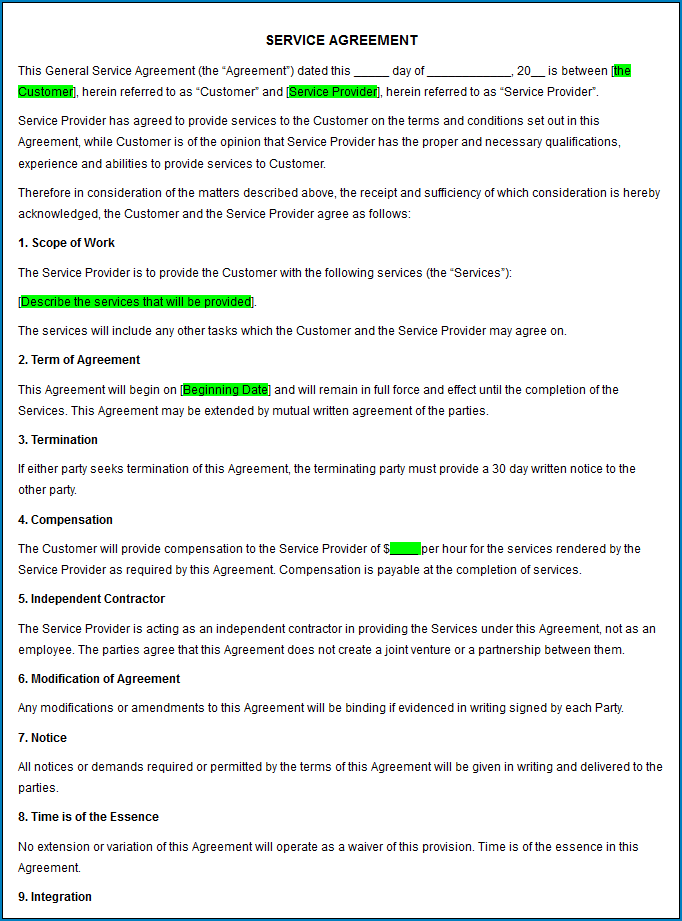A service agreement contract is a legally binding document that establishes clear expectations and facilitates successful business relationships. It provides a framework for the services, prices, and timelines agreed upon by both parties.
A well-structured service contract ensures the protection of interests and fosters predictability in collaborations.

Why is a Service Agreement Contract Necessary?
When entering into a business relationship, it is essential to have a documented agreement that outlines the terms and conditions of the services being provided.
A service agreement contract serves several purposes:
- 1. Establishing Clear Expectations: A service agreement contract clearly defines the scope of work, deliverables, and responsibilities of each party involved. It sets the expectations for both parties and helps avoid misunderstandings or disputes in the future.
- 2. Providing a Legally Binding Framework: A service agreement contract is a legally binding document that protects the interests of both parties. In case of any breach of contract or disagreement, the contract provides a legal basis for resolving the issue.
- 3. Ensuring Protection of Interests: A well-structured service contract includes clauses that protect the interests of both parties. It may include provisions for confidentiality, intellectual property rights, liability limitations, and dispute resolution mechanisms.
- 4. Fostering Predictability in Collaborations: By clearly defining the services, prices, and timelines, a service agreement contract helps create predictability in collaborations. It ensures that both parties are on the same page and can plan their activities accordingly.
How to Create a Service Agreement Contract?
Creating a service agreement contract involves several steps:
- 1. Identify the Parties Involved: Identify the names and contact information of the parties involved in the agreement. This includes the service provider and the client.
- 2. Define the Scope of Work: Clearly define the services that will be provided by the service provider. Include details such as the specific tasks, deliverables, and any limitations or exclusions.
- 3. Outline the Terms and Conditions: Specify the terms and conditions of the agreement, including the duration of the contract, payment terms, termination clauses, and any other relevant provisions.
- 4. Include Intellectual Property Rights: If applicable, include clauses that address intellectual property rights. Specify who owns the intellectual property created during the provision of services.
- 5. Include Confidentiality Clauses: If necessary, include clauses that protect the confidentiality of sensitive information shared between the parties.
- 6. Incorporate Dispute Resolution Mechanisms: Include provisions for resolving disputes, such as arbitration or mediation, to avoid costly litigation in case of disagreements.
- 7. Seek Legal Advice: It is recommended to seek legal advice when drafting a service agreement contract to ensure that it is legally enforceable and protects the interests of both parties.
- 8. Sign and Keep Copies: Once the contract is drafted, both parties should sign it and keep copies for their records. This ensures that all parties are bound by the terms of the agreement.
Examples




Tips for Successful Service Agreements
To ensure successful business relationships, consider the following tips when creating a service agreement contract:
- 1. Be Specific and Detailed: Clearly define the services, deliverables, and timelines to avoid misunderstandings.
- 2. Use Clear and Concise Language: Write the contract in plain language that is easily understood by all parties involved.
- 3. Include Relevant Clauses: Tailor the contract to address specific needs and risks associated with the services being provided.
- 4. Review and Revise Regularly: Regularly review and update the contract to ensure it remains relevant and reflects any changes in the business relationship.
- 5. Seek Legal Advice: Consult with a lawyer to ensure that the contract is legally enforceable and protects the interests of both parties.
- 6. Communicate Openly: Maintain open lines of communication throughout the business relationship to address any concerns or issues that may arise.
Conclusion
A service agreement contract is a crucial document in establishing clear expectations and facilitating successful business relationships. It provides a legally binding framework for the services, prices, and timelines agreed upon by both parties.
By ensuring the protection of interests and fostering predictability in collaborations, a well-structured service contract sets the foundation for a mutually beneficial partnership. Follow the tips outlined in this article to create a comprehensive and effective service agreement contract for your business.
Service Agreement Contract Template – Download